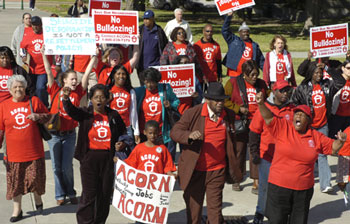
(FinalCall.com) – Over the past year, there been hard-core street organizing in New Orleans on behalf of workers, as well as numerous reports and analysis.
One such report was recently released by the Workers Justice Coalition, the National Immigration Law Center and the Advancement Project, entitled “And Injustice for All: Workers’ Lives in the Reconstruction of New Orleans.” It is more than just a report; it is a telling narrative on the issues of race and class in America today, according to analysts.
“What is happening in New Orleans post-Katrina has revealed a story of race and class that cannot be ignored,” opined Saket Soni of the New Orleans Workers Justice Coalition.
The report is a compilation of personal narratives based on interviews with 700 workers. “Our report breaks the silence of the working population and underscores the pervasive disadvantage and inequity that has shaped the post-Katrina landscape,” stated Judith Brown-Dianis, co-director of the Advancement Project, a national civil rights organization.
“And Injustice for All” details how government and private institutions have locked some workers out of employment and thrust others into situations of abject exploitation and poverty, according to a press release announcing the report. The report also concludes that the underlying cause of workers’ issues in New Orleans is racism at the “systemic level–structural racism.”
“We have been successful in our organizing because we have been able to get workers to see that the root cause of their problem is structural racism, so therefore they do not feed into the culture of blaming each other,” Mr. Soni told The Final Call.
“Structural racism occurs across institutions and throughout society. It occurs because a number of institutions create policies and practices that routinely disadvantage people of color and benefit primarily wealthy Whites,” the report states.
One example of the deep-seated structural racism in vogue in New Orleans is the story of F. Patrick Quinn III, president of Decatur Hotels, which reportedly owns 15 hotels in the New Orleans area. According to a federal lawsuit filed on Aug. 16, Mr. Quinn hired, through an international recruitment company, workers from such places as Bolivia, Peru and the Dominican Republic. The workers were promised six to seven dollars an hour, but most of them paid the recruiting company between $3,500 to $5,000 to get the jobs.
According to a story in The Washington Post on Aug. 17, the workers were here under the federal H-2B visa program. Employers must state that they could not find U.S. workers to fill the jobs.
“Can you imagine that Decatur Hotels could not find any Blacks living in the area to work in their hotels, with 10 percent of them out of work after Katrina?” asked Mr. Soni.
The lawsuit argues that U.S. workers were available and that the company’s goal in hiring foreigners was to drive down wages. The 82 guest workers also contend in their lawsuit that they were recruited under false promises and have been left with thousands of dollars in debt for their visas, recruitment fees and travel.
The report also paints a bleak picture of the circumstances that Black workers faced before Katrina. New Orleans unemployment was 12 percent, more than twice the national rate, as of 2004, according to the report. For Black workers, the unemployment rate was 20 percent higher than the national rate, the report states. “Immigrants do not know that governmental action and inaction have systematically excluded African Americans from work in New Orleans after Katrina and before,” the report continued.
“Blacks see immigrant workers in reconstruction jobs that they cannot access; and they are left to wonder, ‘Are they stealing our jobs?,” Mr. Soni explained. He said that when organizers can get Blacks and immigrant workers in the same room, they are able to get both sides to understand the real enemy.
Those who have sponsored the report state that they have done so “to provide a road map for organizers, advocates and policymakers, providing data and direction.”
(The report, “And Injustice for All: Workers’ Lives in the Reconstruction of New Orleans,” may be accessed online at http://www.advancementproject.org/reports/workersreport.pdf.)












